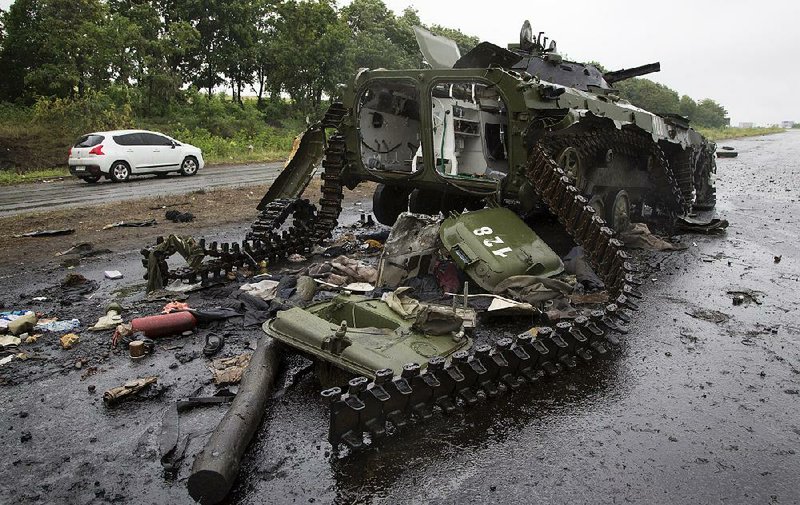NOVOBAKHMUTIVKA, Ukraine -- Three bridges on key roads leading into the Ukrainian city of Donetsk were blown up Monday -- an apparent attempt to slow down any possible assault by government forces on the rebel-held stronghold.
Separatist fighters driven out of Slovyansk and other eastern towns by the Ukrainian army over the weekend had regrouped in Donetsk, a city of 1 million where pro-Russia rebels have declared independence as the Donetsk People's Republic.
It was not clear who blew up the highway and train bridges Monday, but their destruction would most benefit the rebels. Battles between Ukrainian forces and pro-Russia separatists have left more than 400 people dead and thousands homeless since they began in early April.
In the village of Novobakhmutivka, where a rail line crosses over a highway out of Donetsk, an 11-wagon cargo train was perched perilously Monday on the collapsed bridge. The road leads toward Slovyansk, a former insurgent stronghold that was recaptured Saturday by Ukrainian troops. Downing the bridge also damaged the rail line.
Two other bridges on roads leading from Slovyansk to Donetsk were destroyed Monday in the villages of Zakitne and Seleznevka, the Road Transportation Agency of Donetsk region said.
Ukrainian officials on Monday said their troops were setting up blockades to isolate separatists in Donetsk and Luhansk.
"The points of access to these cities are being blocked so that militants are not delivered weapons or manpower or other resources," said Andriy Lysenko, a spokesman for Ukraine's National Security and Defense Council.
It is unclear whether the rebels will be able to put up major resistance in the face of a Ukrainian military attack. Ukrainian forces demonstrated their superior firepower in repelling a rebel attempt to take control of Donetsk Airport in May.
Still, experts say that capturing Donetsk would be much more difficult than retaking Slovyansk, a city 10 times smaller, and it could require the type of street-to-street urban warfare that would favor the rebels, not government troops.
The insurgents control the regional administration building in Donetsk and checkpoints on the city's outskirts. They also face little internal resistance from officials.
There was no word Monday from Ukrainian President Petro Poroshenko, who had promised to start negotiations on a new cease-fire last week.
On a trip to Bulgaria, Russian Foreign Minister Sergey Lavrov pressed again for a new cease-fire in Ukraine. He also condemned the security agency for its "unrealistic demand" that the talks take place in Kiev, the Ukrainian capital, rather than in Donetsk.
Echoing Lavrov, the German government on Monday issued an urgent plea, calling for a rapid, unconditional and mutual cessation of hostilities and said it was urgent to organize talks that included the separatists.
Additionally, French President Francois Hollande and U.S. President Barack Obama are pressing for a meeting "as quickly as possible" to negotiate a bilateral cease-fire in Ukraine, Hollande's office said Monday.
Hollande's office said in a statement that the two leaders spoke by phone Monday and called on Russian President Vladimir Putin to press separatists to accept dialogue with Ukrainian authorities.
However, in a television interview, the deputy chief of staff for Poroshenko's administration, Valeriy Chaly, said Ukraine would follow its own course.
"How to solve the situation in the country -- it is our sovereign right," Chaly said.
Ukraine and the West have accused Russia of fomenting the insurgency by sending troops and weapons, including tanks and rocket launchers, something Moscow denies.
Ukrainian officials said Monday that they had succeeded in sealing the previously porous border with Russia, stopping the influx of new weapons and fighters.
Information for this article was contributed by Yuras Karmanau, Laura Mills and Veselin Toshkov of The Associated Press and by David M. Herszenhorn, Noah Sneider, Alison Smale and Daniel Rzhenetskyy of The New York Times.
A Section on 07/08/2014


